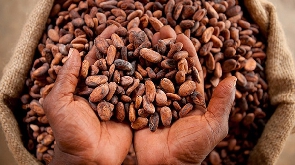 Cocoa is a key export commodity for Ghana
Cocoa is a key export commodity for Ghana
The world’s second-biggest cocoa producer will need to cut its industry regulator’s losses as part of an economic reform program supported by the International Monetary Fund.
Ghana received approval this week for a three-year, $3 billion IMF bailout, with the first disbursement of about $600 million expected this week. Further payments will require the Ghanaian government to meet specific objectives aimed at restoring economic stability and reducing the country’s debt burden ahead of periodical IMF reviews.
Ghana Cocoa Board, known as Cocobod, is one the “main challenges” in the country’s agricultural industry, Stephane Roudet, the IMF’s mission chief for the West African nation, said in an interview. The agency, which purchases beans from farmers and then exports them, has been running losses “that have contributed to higher government debt,” he said.
President Nana Akufo-Addo’s administration plans to reduce the agency’s “quasi-fiscal” activities, such as providing subsidies for farmers to buy fertilizers, in an attempt to improve its financial standing, Roudet said.
“The idea is either to phase these activities out or at least to compensate Cocobod properly for these activities,” he said.
Cocoa is the third-biggest foreign-exchange earner for Ghana after gold and oil. Cocobod, which has a monopoly on exporting Ghana’s beans, has been accumulating losses due to a rising rollover cost of outstanding bills, paying a high purchase price to growers, and the quasi-fiscal operations, the IMF said in a report on Ghana.
The government will also seek “to establish a pricing mechanism that balances the interest of farmers on one side, but also allows Cocobod to operate with balanced accounts,” Roudet said.
Ghana has pledged to restructure most of its $49 billion of public debt to reduce it to 55% of gross domestic product by 2028, to qualify for IMF support. Before the government’s recent interventions, public liabilities had been projected to reach 109% by 2028, according to the Finance Ministry.
Ghana, which has restructured about 88 billion cedis ($8.2 billion) of domestic debt, is now focused on reaching agreements with bilateral and commercial creditors to overhaul its external loans. In December, the country unilaterally suspended interest payments on most of its overseas obligations, including $13 billion of eurobonds, as it engages with investors.
The program targets $10.5 billion in external debt-service relief over three years, according to an IMF report.
“On the external side, the authorities have received assurances from the official bilateral creditors under the G-20 Common Debt Framework,” Roudet said. “The next step on that front, which the authorities intend to complete by the time of the first review of the program sometime in the fall, will be to agree with the official creditors on the specific terms for the restructuring.”
The Washington-based lender is confident that progress with commercial creditors, which include eurobond holders, will also be made “by the time of the first review of the program,” he said. BlackRock Inc. and Allianz SE’s Pimco are among the biggest owners of Ghana debt.
Revenue Boost
To deliver a primary surplus as early of 2024, after years running a deficit, Ghana also needs to implement a wide-range of fiscal measures.
“Efforts are going to be necessary both on the revenue and spending side, but really the program is tilted in favor of the revenue measures because Ghana currently has a very low revenue base,” Roudet said.
Ghana is taking on far-reaching reforms even as it prepares for an election year. President Nana Addo Dankwa Akufo-Addo, who’s completing his last eligible term in office, is set to step down after the December 2024 vote. His longtime rival, the main opposition leader John Dramani Mahama, will run for president against a yet-to-be-selected ruling party candidate, raising concerns about commitment to the program.
“These measures are critical to restore macroeconomic stability and to lay the foundation for strong and inclusive growth,” Roudet said in a response to a question about program continuity. “I believe that these objectives are really shared across the political spectrum.”